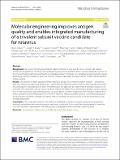Molecular engineering improves antigen quality and enables integrated manufacturing of a trivalent subunit vaccine candidate for rotavirus
Author(s)
Dalvie, Neil C; Brady, Joseph R; Crowell, Laura E; Tracey, Mary K; Biedermann, Andrew M; Kaur, Kawaljit; Hickey, John M; Kristensen, D. L; Bonnyman, Alexandra D; Rodriguez-Aponte, Sergio A; Whittaker, Charles A; Bok, Marina; Vega, Celina; Mukhopadhyay, Tarit K; Joshi, Sangeeta B; Volkin, David B; ... Show more Show less
Download12934_2021_Article_1583.pdf (2.069Mb)
Publisher with Creative Commons License
Publisher with Creative Commons License
Creative Commons Attribution
Terms of use
Metadata
Show full item recordAbstract
Abstract
Background
Vaccines comprising recombinant subunit proteins are well-suited to low-cost and high-volume production for global use. The design of manufacturing processes to produce subunit vaccines depends, however, on the inherent biophysical traits presented by an individual antigen of interest. New candidate antigens typically require developing custom processes for each one and may require unique steps to ensure sufficient yields without product-related variants.
Results
We describe a holistic approach for the molecular design of recombinant protein antigens—considering both their manufacturability and antigenicity—informed by bioinformatic analyses such as RNA-seq, ribosome profiling, and sequence-based prediction tools. We demonstrate this approach by engineering the product sequences of a trivalent non-replicating rotavirus vaccine (NRRV) candidate to improve titers and mitigate product variants caused by N-terminal truncation, hypermannosylation, and aggregation. The three engineered NRRV antigens retained their original antigenicity and immunogenicity, while their improved manufacturability enabled concomitant production and purification of all three serotypes in a single, end-to-end perfusion-based process using the biotechnical yeast Komagataella phaffii.
Conclusions
This study demonstrates that molecular engineering of subunit antigens using advanced genomic methods can facilitate their manufacturing in continuous production. Such capabilities have potential to lower the cost and volumetric requirements in manufacturing vaccines based on recombinant protein subunits.
Date issued
2021-05-01Department
Massachusetts Institute of Technology. Department of Chemical Engineering; Koch Institute for Integrative Cancer Research at MIT; Massachusetts Institute of Technology. Department of Biological EngineeringPublisher
BioMed Central
Citation
Microbial Cell Factories. 2021 May 01;20(1):94
Version: Final published version